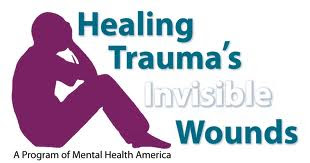Online Newsletter Committed to Excellence in the Fields of Mental Health, Addiction, Counseling, Social Work, and Nursing
May 14, 2012
Healing Trauma’s Invisible Wounds
Mental Health Month Raises Awareness of Trauma and Impact on Children, Families, Communities; New Approaches to Treatment
“Healing Trauma’s Invisible Wounds”
ALEXANDRIA, Va. (April 23, 2012)—For May is Mental Health Month, Mental Health America is raising awareness of trauma, the devastating impact it has on physical, emotional, and mental well-being, and how therapeutic techniques based in neuroscience can mitigate these effects and create dramatic changes in people’s lives.
“As a society, we are just beginning to deal with trauma—bringing it out of the shadows, finding new ways of healing its wounds, and casting off the shame that prevents trauma survivors from seeking help,” said David Shern, Ph.D., president and CEO of Mental Health America.
“Most people think that “trauma” refers only to physical trauma that occurs as a result of a car accident or assault. But it’s much more than that.”
Trauma includes:
■ Interpersonal violence – such as abuse, rape, domestic violence, and bullying;
■ Social violence — such as war, terrorism, and living under oppressive political regimes;
■ Natural disasters and accidents — such as hurricanes, floods, earthquakes, tornadoes, and auto crashes;
■ Serving in combat;
■ Chronic social stressors – such as racism, sexism, poverty, humiliation and cultural dislocation;
■ Childhood trauma—including physical, emotional and sexual abuse; emotional and physical neglect; a parent who’s an alcoholic or addicted to other drugs; a mother who’s been battered; a family member in prison or diagnosed with mental illness; and a loss of a parent through divorce or abandonment
Dr. Shern said trauma has tremendous human and societal costs.
Trauma is the leading cause of the death of children in this country. The effect of trauma on productive life years lost exceeds that of any other disease. The economic cost of 50 million injuries in the year 2000, alone, was $406 billion. This includes estimates of $80 billion in medical care costs, and $326 billion in productivity losses. And the predicted cost to the health care system from interpersonal violence and abuse ranges between $333 billion and $750 billion annually, or nearly 17 to 37.5 percent of total health care expenditures.
When children or adults respond to traumas with fear, horror and/or helplessness, the extreme stress is toxic to their brains and bodies, and overwhelms their ability to cope, Dr. Shern said.
“While many people who experience a traumatic event are able to move on with their lives without lasting negative effects, others may have more difficulty managing their responses to trauma.”
Unresolved trauma can manifest in many ways, including anxiety disorders, panic attacks, intrusive memories (flashbacks), obsessive-compulsive behaviors, Post-Traumatic Stress Disorder, addictions, self-injury and a variety of physical symptoms. Trauma increases health-risk behaviors such as overeating, smoking, drinking and risky sex. Trauma survivors can become perpetrators themselves.
Dr. Shern said unaddressed trauma can significantly increase the risk of mental and substance use disorders, suicide, chronic physical ailments, as well as premature death.
The Adverse Childhood Experiences (ACE) Study, one of the largest investigations ever conducted to assess associations between childhood maltreatment and later-life health and well-being, demonstrated that trauma and other adverse experiences are associated with lifelong problems in behavioral health and general health.
Until recently, trauma survivors were largely unrecognized by the formal treatment system. The costs of trauma and its aftermath to victims and society were not well documented. Inadvertently, treatment systems may have frequently re-traumatized individuals and failed to understand the impact of traumatic experiences on general and mental health.
But that is changing. Researchers have learned how trauma changes the brain and alters behavior.
A movement for trauma-informed care has emerged to ensure that trauma is recognized and treated and that survivors are not re-victimized when they seek care. Complementing these changes are programs to promote healthy development of children and healthy behaviors in families, schools and communities that reduce the likelihood of trauma.
“It is critical that these efforts strengthened and we heal the invisible wounds of trauma,” Dr. Shern said. “They are crucial to promoting the healthy development of children and families.”
For more than 50 years, Mental Health America and its affiliates around the country have led the observance of May is Mental Health Month by reaching millions of people through the media, local events and screenings. This unified effort includes educational messages about mental health and substance use conditions and the importance of mental health ceus for counselors
Mental Health America (www.mentalhealthamerica.net) is the nation’s largest and oldest community-based network dedicated to helping all Americans achieve wellness by living mentally healthier lives. With our more than 300 affiliates across the country, we touch the lives of millions—Advocating for changes in mental health and wellness policy; Educating the public & providing critical information; and delivering urgently needed mental health and wellness Programs and Services.
Labels:
ceus for counselors,
ptsd,
trauma,
wounds
Subscribe to:
Post Comments (Atom)



No comments:
Post a Comment